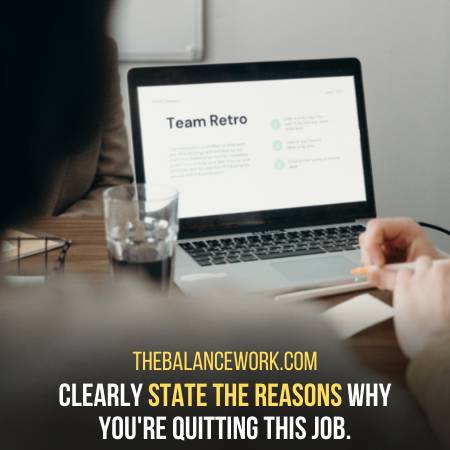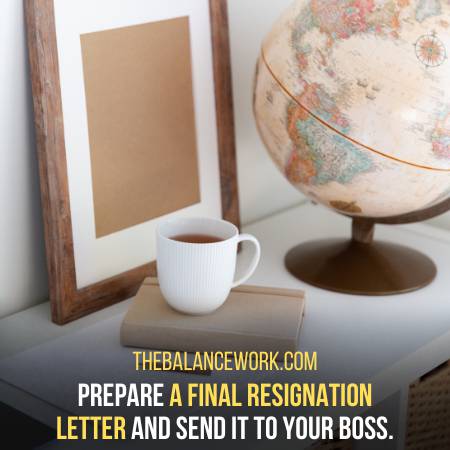Each one of us has experienced changes throughout the career when we seek new opportunities.
Quitting a job isn’t a big deal but maintaining a good relationship with the employer is!
How To Tell Your Boss You’re Quitting – 7 Easy Steps
Your previous employer or coworkers can be a good reference for you. They can be the doors of great opportunities in the coming future.
But telling this bitter news to your employer is a bit harder. So how to inform the boss you’re quitting without hurting sentiments or relation?
This article briefly explains the steps to tell your boss and keep that relation you built by hard work.
1. Go Directly To Your Manager
Once you’ve decided to quit, you should arrange a private meeting with your boss. It will help to keep your professional relationship strong if you resign privately.
Meeting privately can be a professional way to talk to your boss about why you are leaving and what you can do to help.

However, if you’ve already decided the time to resign, talk to your boss before that time. In that way, you and your boss will have reasonable time to make arrangements.
It also gives respect to your employer as you value his time and his position.
2. How to Tell Your Boss You’re Quitting – Mention The Reasons To Quit
There can be various reasons behind a person quitting his job. For example, he might be moving to another city or wanting a career somewhere else.
So when you plan to quit your job, think about your reasons for leaving. It will help you to talk to your boss confidently.
If you’re quitting for another opportunity, tell your boss what you learned from. Also, mention that these things will be advantageous in your new job.

If the reason is the previous job experience, mention the opportunities this position provided you.
Also, clarify the opportunities your new job will provide you. And state why these are important for your career.
Once you consider the reason behind qutting, it will clarify the areas to make improvements in your position to stay.
If the reason for quitting is to improve work-life balance, the supervisor might alter your schedule.
3. Give A Prior Two Weeks’ Notice
Many workplaces require professional courtesy of giving a two weeks’ notice before quitting.
It’s a good way as it makes your employer well-aware of the exact date when you’ll be leaving.
Your boss will get time to recruit and train a person as your replacement. In other cases, he will adjust your tasks with the existing staff.

If you are able to stay for a bit more, you can give a long period for transition. However, if your next employer wants you to start soon, you can also provide a short period of notice.
Give a two weeks’ notice before you decide to meet your boss in person. And write the exact date of leaving in the official resignation letter.
Both these methods show that you’re a responsible person who knows how to make a smooth transition.
4. Have A Transition Plan In Place
It’s a good opportunity to maintain a good connection with the boss. You can offer your transition plan and help your boss to prepare for your leave.
For instance, you can assist your boss in finding potential people for replacement. Also, try to finish as much your on-going projects as you can.

You can also outline the requirements for those projects you thin you can’t complete. It would be helpful to train someone from the team to handle your responsibilities temporarily.
When you help your boss with such tasks, you’ll show your concern for the success of the company.
It also makes your relationship with the coworkers strong by showing your care for the continued success.
5. Leave Gracefully And Show Gratitude
Prepare yourself if your boss asks you to leave immediately. On the other hand, if you leave when the final day comes, keep things positive.
You should never burn bridges. Instead, when you see your boss in person, tell him you are grateful for all the opportunities.

Mention the skills you learned and the connections you made; thank your boss for all such things.
However, thanking the boss in the letter of resignation is also a good option. You can also send a thankyou note.
If your coworkers were supportive in your journey, you could also thank them through an email.
These things
strengthen your relationship with the previous boss and help in career.
6. How To Tell Your Boss You’re Quitting – Give Constructive Feedback
Give constructive feedback about your experience at the workplace to your boss.
You can give feedback in the very first in-person meeting for resignation. Yet, some companies have an “exit interview” where you can talk about the experiences you have.
In such interviews, they ask you to give feedback on your office experience.

You can also talk about the advantages of training (if you received any). Company culture, relationships with boss or coworkers are some other factors for feedback.
You need to make sure to give constructive, honest, and specific feedback.
If you’re resigning because of your bad experience, you can mention the week areas to your manager. In this way, it’ll be easier for the company to make improvements.
Your contributions will help the company to strengthen employee retention.
7. Provide The Resignation Letter
In the end, prepare a letter for formal resignation and it should state the reason for your quitting. Your employer will have a proper record of why you left in this way.
Begin by stating your last workday and show gratitude for the opportunities you got.

Make sure that the letter contains the signs that you’re preparing for your leave.
Take a copy of your resignation letter with you in the resignation meeting.
Keep your resignation professional and be courteous.
8. Say Goodbye To The Team:
You might have a great relationship with your boss. But that doesn’t mean the rest of the team will be as understanding when you give notice.
It’s best to say goodbye and thank them for their help in person. Start with the people you’re closest to, then move on to the rest of the team.
This way, you can avoid any awkwardness or tension that might come up if you just disappear without saying anything.
Your team is going to have to cover for you while you’re gone. So it’s only fair to give them a heads up and say goodbye.
9. Hand Over Your Work:
Give your boss a list of everything you’re working on. This includes any unfinished projects, as well as any ongoing tasks or responsibilities.
This way, they can start making arrangements for how to cover your work while you’re gone.
It’s also a good idea to leave behind detailed instructions for anything that might be difficult to hand over.
In the end, you want to make sure that your boss is left in a good position. They shouldn’t have to deal with any additional stress because of you.
Should I Tell My Boss Before Resigning
It is legally and ethically acceptable to resign without notice. But it is generally considered more professional to provide your employer with two weeks notice. Here’s two situations though:
1. Good Relationship With Boss:
If you have a good relationship with your boss, telling them before you hand in your resignation letter can make the process smoother.
It gives them time to prepare for your departure and find a replacement. It also shows that you respect their position and value their opinion.
2. Good Relationship With Boss:
However, if you do not have a good relationship with your boss. Or if you are worried about reprisals, it is perfectly fine to resign without notice.
You don’t have to give a reason when you resign. But it is always a good idea to be polite and professional.
The main thing is to be respectful and professional in your resignation letter. And be professional in your dealings with your employer during your notice period.
There are pros and cons to both options. It really depends on your relationship with your boss and your comfort level.
Sometimes, however, it is mandatory to give notice. Check your employment contract to see if there is a notice period required.
If you are unsure, consult with an attorney specializing in employment law.
Frequently Asked Questions
How Do You Politely Quit Your Job?
Give a two weeks’ notice to your boss in a one-on-one meeting and keep it positive. Keep it positive, neutral, and brief, and also offer help for transition. Finally, say a polite goodbye to your coworkers.
How Do You Start A Conversation With Your Boss When You Quit?
First of all, request a meeting with your boss and briefly explain why you’re quitting. Be gracious and positive and ask for their point of view. Then, you can suggest a goodbye event to your boss.
How Do You Tell Your Boss You Are Quitting Without Notice?
Write a letter to your boss and state the day when you’re leaving. Avoid going into too many details and express your gratitude. You can ask questions if you have any and provide your contact information.
How Do You Tell Your Boss You Are Quitting For Personal Reasons?
Speak to your boss and follow up with a resignation letter; send this letter to HR as well. You can choose how much to share with HR but explain that you’re leaving for personal reasons.
Conclusion
Your final days at the company are no time to tune out, and you should make the most out of these.
You should share information with your coworkers about the ongoing projects and clients.
You are documenting the process for those coming after you is a great gesture for the company.
If you know what to say when quitting the job and be respectful, you can keep professional relationships.
A good attitude is necessary to keep the doors open to returning to your current employer.
Leave a comment in the section below to share your thoughts.
Last Updated on 12 hours by Aleena
- 7 Jobs For People With Cerebral Palsy – Tips To Manage Yourself - October 6, 2022
- 15 Easy-On-Hand Jobs For People With Chronic Fatigue In 2022 - October 2, 2022
- 9 Effortless Jobs For People With Agoraphobia - October 1, 2022